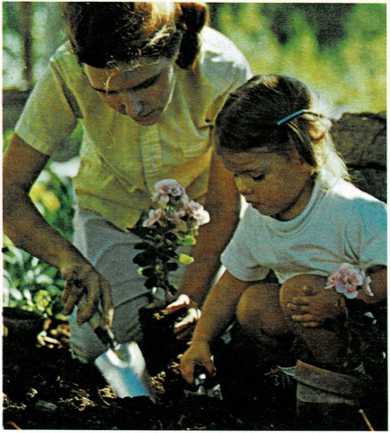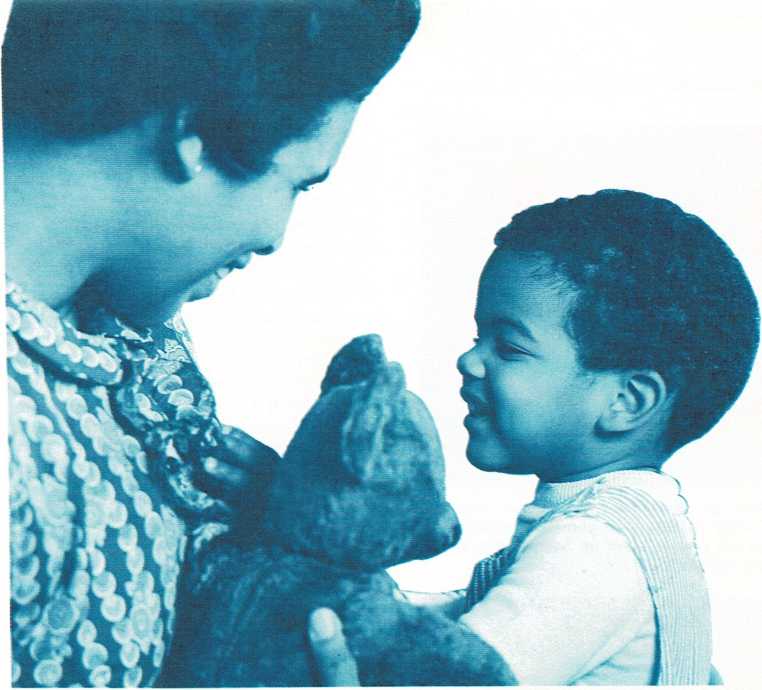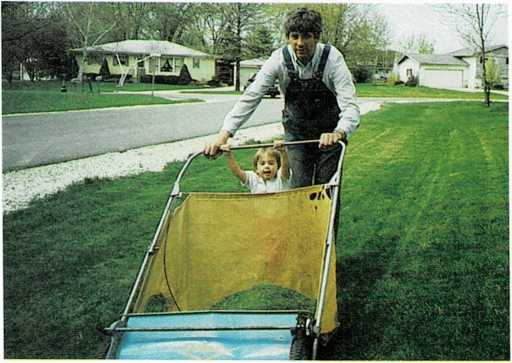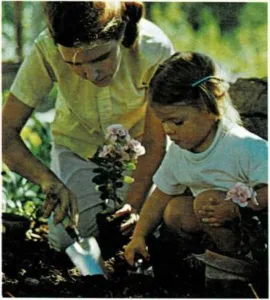The toddler’s education

The role of play
Toddlers at play are really at work coping with their environment. They
think they have complete control, but they learn that many things are
immovable (walks, trees, cement). They also learn that some things are
taboo (hurting pets, hurting other children) and that some things are
painful (a hot stove, falling).
When they are with other children their own age, they usually try to
dominate. But, depending on their sex and their genetic and neurological
makeup, they may sit quietly as

“Playing” with mother is not merely play. It is an important way the
toddler learns.
passive observers or tearfully withdraw to thumb-sucking. Or, they may
ignore playmates for a ball, blocks, or a stuffed animal. Children
rarely play together until they are close to 3 years old.
Because human beings want and need love from other human beings,
children learn to control impulsive, aggressive, domineering attitudes
when their onslaughts bring tears, withdrawal, or counterattacks from
playmates. Parents usually act as referees when toddlers are romping
together. It is not fair to expect toddlers to behave like perfect
ladies and gentlemen. This is a period when they just have to run
roughshod over their environment. A hellion at home may be an angel at
nursery school. This is a good sign that the toddler has some ability at
selfcontrol. By age 3, the child should be able to play with another
child sometimes, or at least play alongside another child.
Toys
When toddlers play, they imitate things they have experienced themselves
and things they see adults doing. Toddlers cuddle and feed dolls and
stuffed animals. They follow parents around and “help” with chores. They
enjoy clambering under tables and chairs to dust furniture legs. Using
toy carpet sweepers or toy lawn mowers, they clean rugs and cut grass.
They probably won’t stay with jobs very long, but they get a sense of
belonging and develop manual skills while walking, crawling in and out
of small places, and pushing their toy tools.

Toddlers are talkers. And although they are not very good at first,
they improve day by day. The best thing you can do is be a good
listener.
Educational toys for toddlers have simple parts that fit together. Some
of these toys have big bolts and locks, gears and wheels. Some come
apart in several pieces and require dexterity to reassemble—dexterity
children gain only through practice.
Here are some other playthings toddlers will enjoy:
Toys with handles that they can push and pull along the floor
Large balls they can throw and chase
Objects that they can load and unload in a toy truck
Boxes that fit together, and into which they can put things
Baby dolls and stuffed animals
A sandbox or dirt pile for digging in
A bathtub or small pool for splashing and kicking in, with sponges to
squeeze, boats or animals that .float, and a plastic pitcher to fill up
and empty
A broom or other housekeeping toy to “help” with
Learning to talk
Speech is one indication that we are intelligent beings. It is also a
more effective way to communicate than kicking and shoving. When
toddlers begin to talk, they are more able to get their points across
without frustration. Temper tantrums begin to decrease. Toddlers spend
so much of their time imitating others that their speech and vocabulary,
in general, will reflect the verbal skills of those around them. Avoid
baby talk. State sentences and messages to a toddler directly and
clearly. Offer choices, but make sure both options are ones you can live
with. To encourage toddlers to go to bed, say, “Do you want to say your
prayers now or after you get into bed?” To get them to eat some peas,
say, “Do you want six peas or seven peas?”
Parents need to listen when their toddlers speak. Smiles and nods will
encourage children’s speech attempts. If toddlers have trouble
remembering the right words, they

Toddlers like to imitate their parents and often enjoy helping with
some of the work around the house, such as baking pies and mowing the
lawn.

should be asked to try to tell the same thing in a different way.
Stammering at age 3 is a normal stage in speech development. Thoughts
seem to be going faster than the ability to say the words. Overzealous
attempts to correct toddlers’ speech may make them self-conscious and
frustrated. For more information, see [Stuttering] in the
Medical Guide.
Storytelling
Educators know that children who come from homes where reading and books
are valued are more likely to succeed academi
cally than those from homes without this interest. Toddlers can be
encouraged to read and listen and enjoy literature if their parents read
to them from books that were written with the appropriate age and
attention span in mind.
Story time can be a rich twenty minutes for parents and children and
long cherished by both. It may be the only time during the day that
nagging and whining are absent. It brings new thoughts and feelings to
the participants. As a result, a toddler will often break in with a
question or an observation. When this happens, stop reading for a
moment. Your toddler probably wants to learn something or share
something with you.
Sometimes, a child wants to hear the same story every night. A word or
two cannot be skipped without loud protest: “You didn’t say rabbitl”
It is difficult to say why some children want or need to have one
favorite story read over and over again. Do not be concerned about it.
This stage, too, will pass.
Learning by imitation
A wise philosopher once stated that children force parents to become
more mature. Parents sense the responsibility they have in civilizing
the animal inside every child and raising the child to become a
responsible adult. Parents who love their children will feed love into,
and provide limits for, their children. Then these children, when they
become parents themselves, will be able to imitate these methods. Some
of the most disorganized young adults become the most efficient
housekeepers when away from their mothers and confronted with the
challenge of their own children.
Sometimes it is difficult, but parents should let their children know
the joys and rewards of being parents and responsible adults. Toddlers
need to experiment with these roles by imitating them. They also need to
feel the variety and range of human emotions—love, fear, anger,
grief—and learn when these are appropriately expressed. For example, a
toddler should not be sheltered from the fact of a loved one’s death,
but be allowed to experience the sorrow of the loss.

